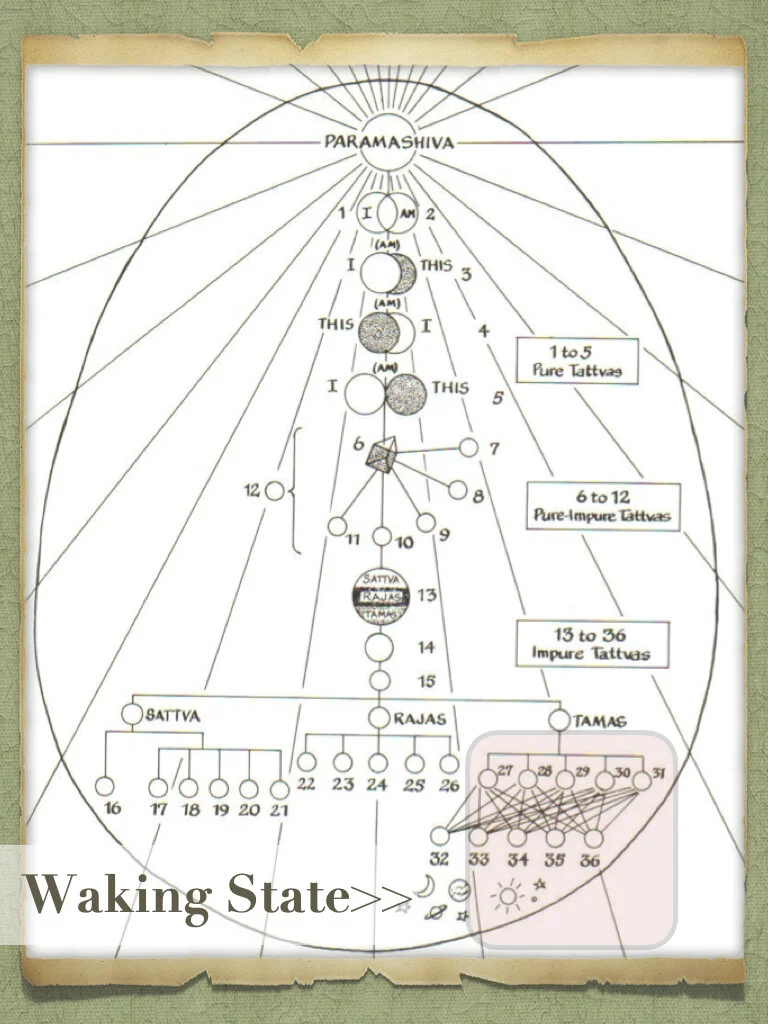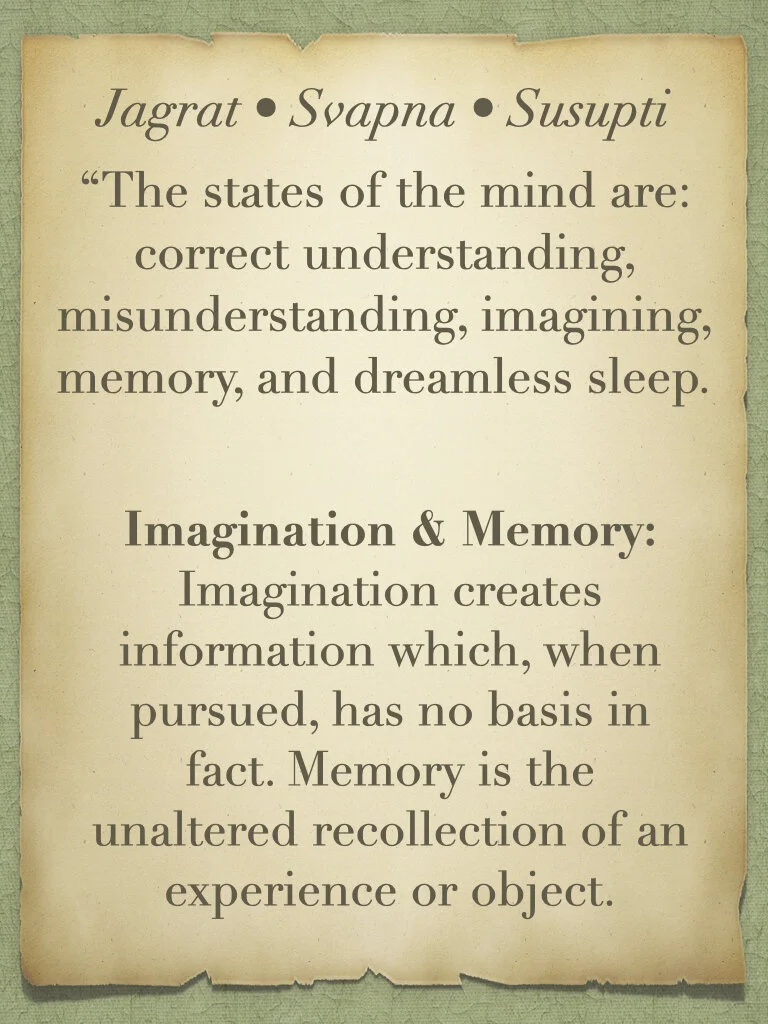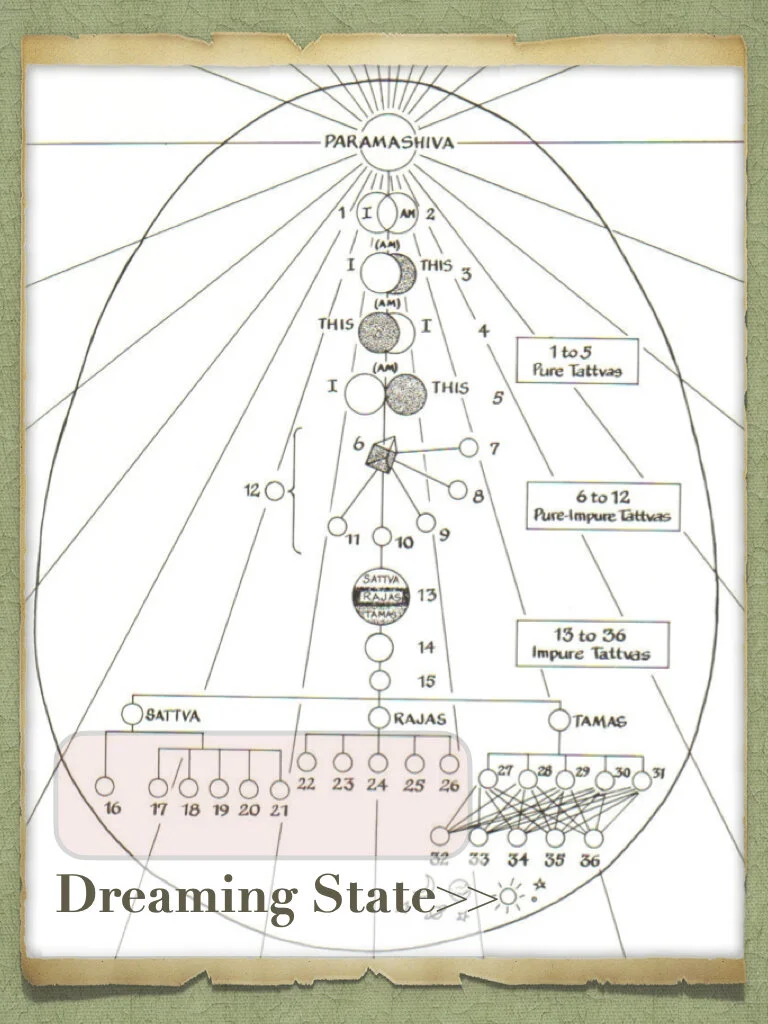Sheathing the Sword of the Mind: Shiva Sutra 3.20
Summary: We use the mind as a sword in our daily lives, thoughts and even in our dreams, to slice fight for our likes and fight against our dislikes. Accepting and rejecting, though, this sword becomes dull. In this Sutra we learn how and when to sheath this sword of the mind, so that it can be oiled with the nectar of inner awareness.
Video Note: There was a problem recording and the video is ‘zoomed out’ to show the whole class— the slides from class are posted below to assist in your study— so have no fear, the info’s all here!
Shiva Sutra 3.20: Triṣu Caturthaṁ Tailavadāsecyam // The fourth state (turya) must be expanded like oil so that it pervades the other three: waking, dreaming, and deep sleep.”
“What are the three states? The three states are the waking state (jāgrat), the dreaming state (svapna), and the state of deep sleep (suṣupti). The fourth state (turya), which is filled with pure knowledge, pure light and the ecstasy and joy of turya, must be sprinkled and expanded just as oil expands when it is poured on a smooth surface like a piece of cloth. For just as oil spreads on this surface, adhering to it, so in this way a yogī must expand the state of turya into the other three states.”
Jagrat- Waking state, awareness and navigation of your daily life and external world. Later referred to as the “Gross Body”, meaning the elements and senses.
Patanjali called “Correct/Incorrect understanding”
Tattvas 27-36, Elements
Svapna- Dreaming state or thought state. The is is awareness of an unseen world, the world of the mind. Later referred to as “Prana”, which implies the organs of action and knowledge, your ability to work with the elements around you.
Patanjali called “imagination and memory”
Tattvas 16-26, powers of knowing and acting
Susupti- Dreamless sleep state. Later referred to as Purastaka, which implies a subtler aspect of our mind, perhaps we underestimate what is meant by the mind if it is grouped with this state.
Tattvas 13-15, the mind
The sword and the sheath
“The three states—jagrat, svapna, and suṣupti, along with turya—are like a sword and its sheath. Here, the three states are said to be found in the sheath of turya. And although the three states are separated from turya, as a sword is separated from its sheath, they are united with each other. In the same manner, the yogī must be aware that jagrat, svapna and suṣupti are found as one with turya.”
The text gives us a specific analogy to hep relate the 3 states to the turya state: “the three states—jagrat, svapna, and suṣupti, along with turya—are like a sword and its sheath. Here, the three states are said to be found in the sheath of turya. And although the three states are separated from turya, as a sword is separated from its sheath, they are united with each other. In the same manner, the yogī must be aware that jagrat, svapna and suṣupti are found as one with turya.”
This analogy serves us on a few levels.
Although the three states have different qualities, we can assume they all resemble each other in that they are states of differentiation, states of the mind, states of limitation. And that unlike these three, Turya is not a state of difference, is above the mind, and is unlimited. This is also obvious due to its description as pure knowledge, pure light and joy.
THe analogy of a sword also shows us the role of the three states as well as the role of the turya state. Ie. We use the three states of mind as a sword to cut through life, to carve out our individual path and personality, to defend and pursue our likes and keep away our dislikes. And that we often do this from a place of separation, meaning, the sword is out of its sheath when we use it to carve our way through life.
We generally only access this place of nectar, the Turya state, when the sword of our mind is in its sheath— that is, when we sit for meditation in a safe place and practice putting down our mind over and over again, surrendering the swashbuckling of our mind.
Another time the Sutra tells us that we can find this Turya state is when we take the sword out of its sheath, and when we put it back in its sheath.
“The state of turya is found in all these three at the moment of entry and at the moment of exit. So at the time of entering into the state of wakefulness, or the dreaming state, or the dreamless state, and at the time of coming out from any one of these three states, the yogī finds turya existing.”
Transition 1, Falling Asleep: This brings to mind practices such as trying to go to sleep at night from a conscious place, such as doing mantra into your sleep, as Babaji has taught many times.
Transition 2, Waking up: It also brings to mind the practice of doing gratitude practice, just one example, upon waking up as a way of accessing this turya state as we transition between dreaming and waking. In both cases we are told that we must learn to “hold” the transition point between states as a means of spreading the bliss of Turya into the 3 states.
Transition 3, During your Day: Dreaming doesn’t just mean at night, dreaming also means thinking. Therefore, the end of a thought or experience is also a transition point. In previous sutras this was known as Nimesha, the ending of one thought, which brings you to the space between thoughts, Turya, before another one begins, Unmesha. This can be hard to contemplate, because thoughts are so subtle, but I often work with this practically by using my practice when walking from one room to the next— I find that this space is usually the space ‘between thoughts’ quite literally. So in this space, our work is to keep the sword of our mind in its sheath— but of course, we usually pull out our phones out, or start going over something in our mind, and pull that sword right back out. But we are not only dulling our sword, by over using it, we are also missing an opportunity to experience a worm hole to our true nature. So try keeping your sword in its sheath while you walk from room to room in your house, or in your day— try to hold that space of Turya between thoughts and spread it into your life.















